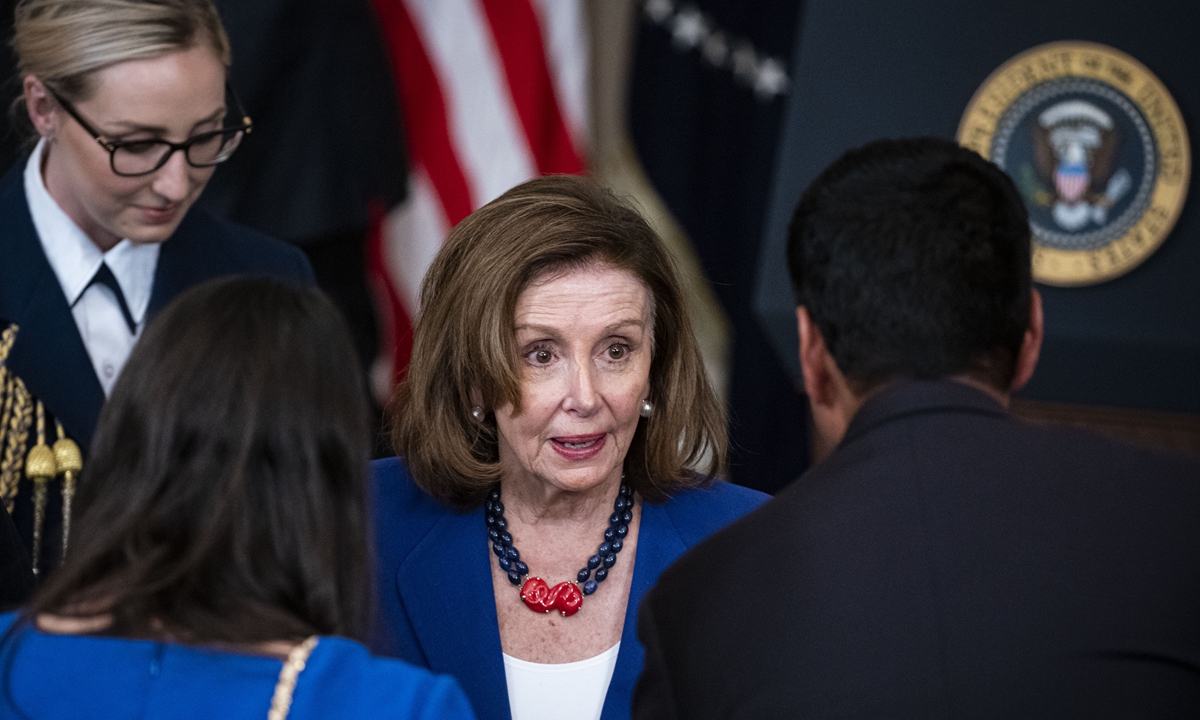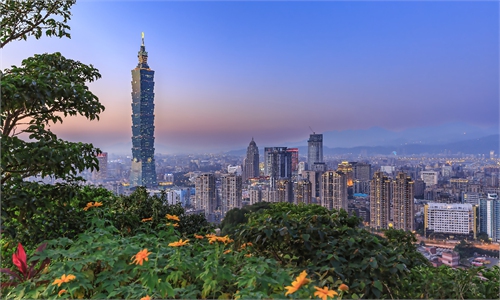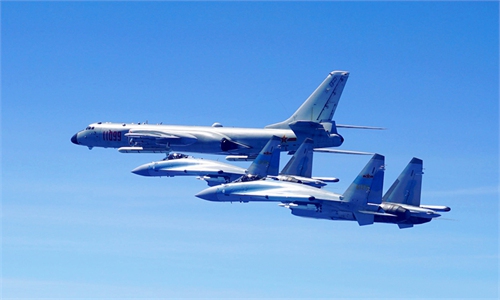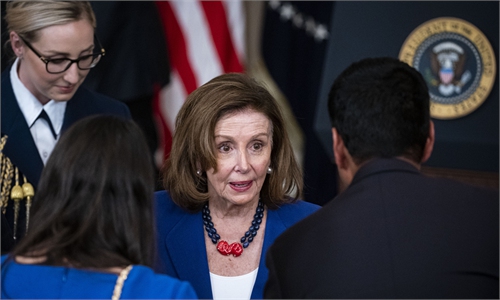Pelosi ‘tests positive, postpones Asia trip’ after China warns resolute, forceful measures over reported Taiwan visit
PLA always well prepared; relevant US politicians could be sanctioned: expert

US House Speaker Nancy Pelosi departs the White House in Washington DC following a signing event for a postal service reform act on April 6, 2022. Pelosi tested positive for COVID-19 on April 7 and postponed her Asia trip and reported visit to the island of Taiwan. Photo: VCG
If US House Speaker Nancy Pelosi visits the island of Taiwan, as some media have reported, China will definitely respond with "resolute and forceful measures," the Chinese Foreign Ministry said on Thursday. Chinese experts said China will and must retaliate; otherwise the US will make more provocations in the future, and the consequences that could be caused by the potential visit would bring a "disruptive impact" on the foundation of China-US relations.The reports that "Pelosi is scheduled to arrive in Taiwan on Sunday" after her trip to Japan later this week in a show of support for Taiwan amid "concerns over cross-Straits relations following the Russia-Ukraine crisis" have been seen on Taiwan media and Japan's Fuji News Network on Thursday, but neither the office of Pelosi nor the Democratic Progressive Party (DPP) authority on the island have confirmed or denied such reports.
However, China takes the information seriously. Zhao Lijian, spokesperson of the Ministry of Foreign Affairs, said at a routine press conference on Thursday that if Pelosi visits the island, "it would bring serious damage to the foundation of China-US relations, and would send the wrong messages to the Taiwan secessionists. China firmly opposes it and has already lodged solemn representations to the US."
"China would respond with resolute and forceful measures, and all ensuing consequences would be borne solely by the US" if the visit takes place, Zhao noted.
Pelosi tested positive and postponed her Asia visit, according to media reports later Thursday. This could be a decent step back, said some observers.
Ma Xiaoguang, spokesperson of the Taiwan Affairs Office of the State Council, also said in a statement on Thursday, "We warn the DPP authority that it should immediately stop any collusion with foreign forces to seek secessionism, and all crimes that it has made will be punished eventually."
The measures will not be the same as the ones provoked by previous trips to the island made by lower-level or former US officials, said analysts, stressing that the response will and must be forceful enough to effectively warn the US about the seriousness of challenging the political foundation of China-US relations.
Chinese President Xi Jinping told US President Joe Biden on March 18 during a video call requested by the latter that mishandling the Taiwan question will have a disruptive impact on bilateral ties. "China hopes that the US will give due attention to this issue," the Xinhua News Agency reported.
As Biden has reiterated that the US does not seek to have a new cold war with China, to change China's system, or to revitalize alliances against China, and that the US does not support "Taiwan independence" or intend to seek a conflict with China, "I take these remarks very seriously," Xi said.
Chinese experts said if Pelosi visits the island, the consequences would be much more serious than Newt Gingrich's visit to Taiwan in 1997. Because although Gingrich was the sitting House Speaker, he was a Republican while the then Bill Clinton administration was Democratic. But this time, both Pelosi and Biden are Democrats, and Pelosi won't be able to make the trip if Biden opposes it, and this would mean that the Biden administration is cheating China since Biden has failed to keep his promises.
The international issues that require China-US cooperation like mediating the Russia-Ukraine crisis, Iranian nuclear deal, Korean Peninsula issue, climate change, and world economic recovery, as well as preventing a global financial crisis and food crisis, will be interrupted, said analysts.
Biden's acquiescence and connivance with Pelosi's trip to the island of Taiwan is seen in China as undermining America's commitment to the one-China principle, said Diao Daming, associate professor at the Renmin University of China in Beijing.
Diao said "the US may think they are smart and think that Pelosi's Taiwan island trip will increase the leverage for dialogue with China. But they can do nothing but mess things up."
Xin Qiang, deputy director of the Center for American Studies at Fudan University, told the Global Times on Thursday that China will definitely respond forcefully; otherwise the US will push it further, and the US should not doubt and underestimate China's determination and courage.
Four PLA aircraft entered Taiwan island's self-proclaimed southwest ADIZ on Thursday, with a Y-9 electronic warfare aircraft flying to the east of the island, the island's defense authority said.
The Y-9 electronic warfare aircraft's flight was also reported by Japan. The country's Ministry of Defense Joint Staff said in a press release on Thursday that it was the first time the Japan Air Self-Defense Force has confirmed this type of aircraft in the area.
Another Taiwan Straits crisis?
"The signal sent by the Ministry of Foreign Affairs is very clear. Next, we can focus on what actions would be made by other relevant departments and ministries, especially the People's Liberation Army [PLA]. More forceful measures are necessary to deter the US from making more risky and extreme moves on the Taiwan question," said Li Haidong, a professor from the China Foreign Affairs University.
The countermeasures would include military and non-military ones, said experts. Song Zhongping, a Chinese military expert and TV commentator, said the PLA doesn't need to specifically set special plans ahead of the reported visit, because "the PLA is always prepared and has conducted relevant training all the time."
"Apart from military actions, China could also sanction US officials who visit the island," Song noted.
The predictions are based on the hypothetical prerequisite - whether the Pelosi trip to Taiwan takes place. Hopefully, the US could stay reasonable and a crisis could be avoided. But if it takes place, the US will have to face another Taiwan Straits crisis that it cannot handle, said experts.
Lü Xiang, a research fellow on US studies at the Chinese Academy of Social Sciences in Beijing, told the Global Times on Thursday that sending military aircraft across the island is highly likely and the missions could take place in multiple areas over the island.
"The PLA could even establish a no-fly zone over the island to prove China's sovereignty over the island. The PLA Air Force and Navy are capable of conducting such missions, and if Taiwan military forces dare to interrupt, they will pay a heavy price as well," said a Beijing-based military expert who asked for anonymity.
"The US decision-makers need to understand that the more provocations they make, the more resolute China will be in preparing to solve the Taiwan question by non-peaceful means," as the US side and the Taiwan secessionists will make the Chinese mainland lose faith in peaceful resolution of the question. When the conditions get mature, the PLA will take actions to solve the problem once and for all, Song said.
Pelosi is reportedly concerned about a "change of the status quo by force," but her reported visit will definitely force China to take further actions aimed at reunifying the island by force, Lü noted.
According to media reports, Pelosi's visit will commemorate the 43rd anniversary of the Taiwan Relation Act, a US law that violates the principles for China and the US to establish diplomatic ties. And this act has maintained the unlawful arm sales from the US to the island and gives space for Taiwan secessionists to hold wishful thinking that expect the US to defend the island by force against the reunification of China, said experts.
"The PLA will take powerful measures, resolutely defeat all kinds of foreign force interference and Taiwan secessionist attempts and firmly safeguard national sovereignty and territorial integrity," Senior Colonel Tan Kefei, spokesperson of China's Ministry of National Defense, said in a statement on Thursday.
Confidence and patience
However, if the US intends to make itself a safe haven for international capital flows by pushing China to retaliate and cause another crisis in Asia while the Russia-Ukraine crisis is troubling Europe, China won't be made use of so easily, said analysts.
The retaliation doesn't necessarily mean an all-out military operation to solve the Taiwan question, as China has confidence and patience to push reunification based on its own schedule, experts noted.
Compared to China's calmness, the US is being very cautious. "Unlike previous US officials' and lawmakers' Taiwan visits, which were announced in advance, Pelosi's rumored visit was only released by Japanese media, and no other Washington-related sources and US media have been leading the way," Diao said. "This is very strange."
"If the tour is to mark the 43th anniversary of the Taiwan Relation Act as what the media reported, it would be time to make a high-profile visit, rather than try to keep it a secret. If there is still no response from Pelosi in the next 24 hours, the US attitude would be in question," Diao noted.
Chinese experts said despite the Taiwan question and the Ukraine crisis being entirely different in nature, similarities lie in the Biden administration's manipulation on the two events.
The US keeps Europe close to Washington by stirring up the Ukraine crisis and playing up "Russian threats," said Diao. "It also fans the flames on the Taiwan question and plays up the 'China threat' to advance its Indo-Pacific Strategy."
Lü said US politicians in Washington want to show that they are not begging China for cooperation when they are facing trouble with Russia, and by making more provocations on the Taiwan question, they want to stress that the US is not giving up on the Indo-Pacific Strategy and will stay tough against China.
But such a strategy that could make the US confront China and Russia at the same time could eventually overdraft the national strength of the US and makes Washington pay a heavy price, said analysts.
The US should learn from the Ukraine crisis "what would happen when pushing a great power into a corner," Xin said.





